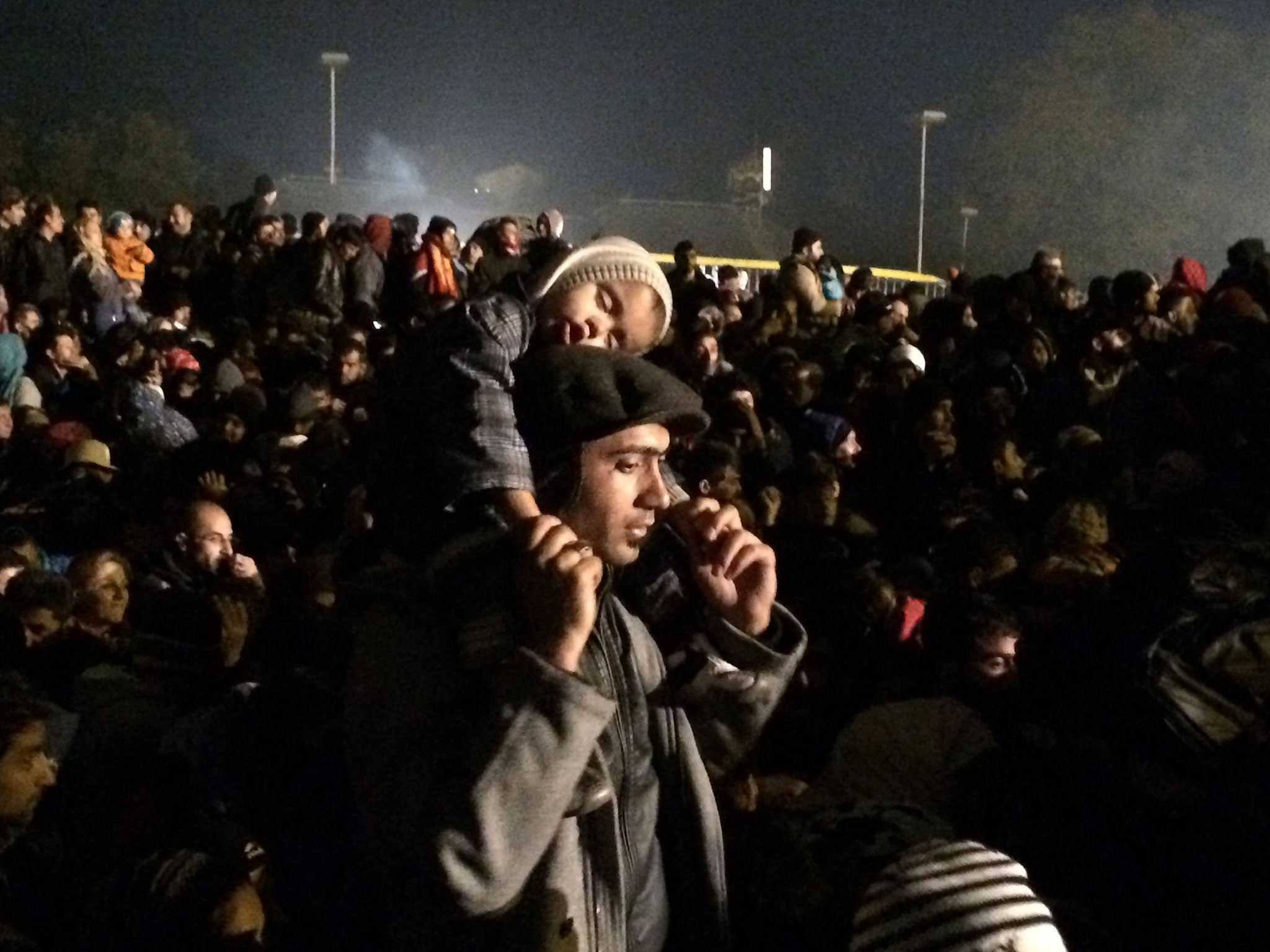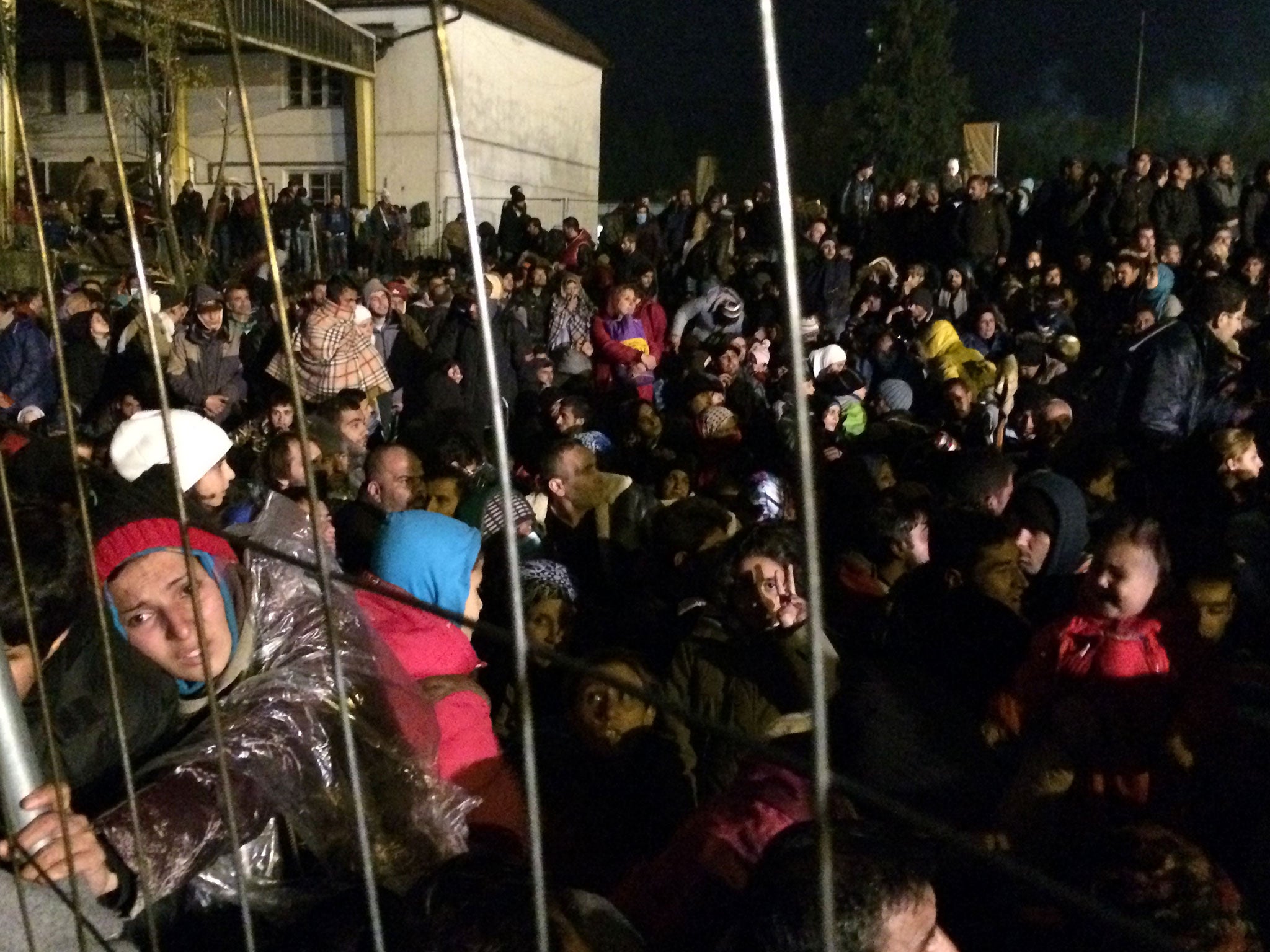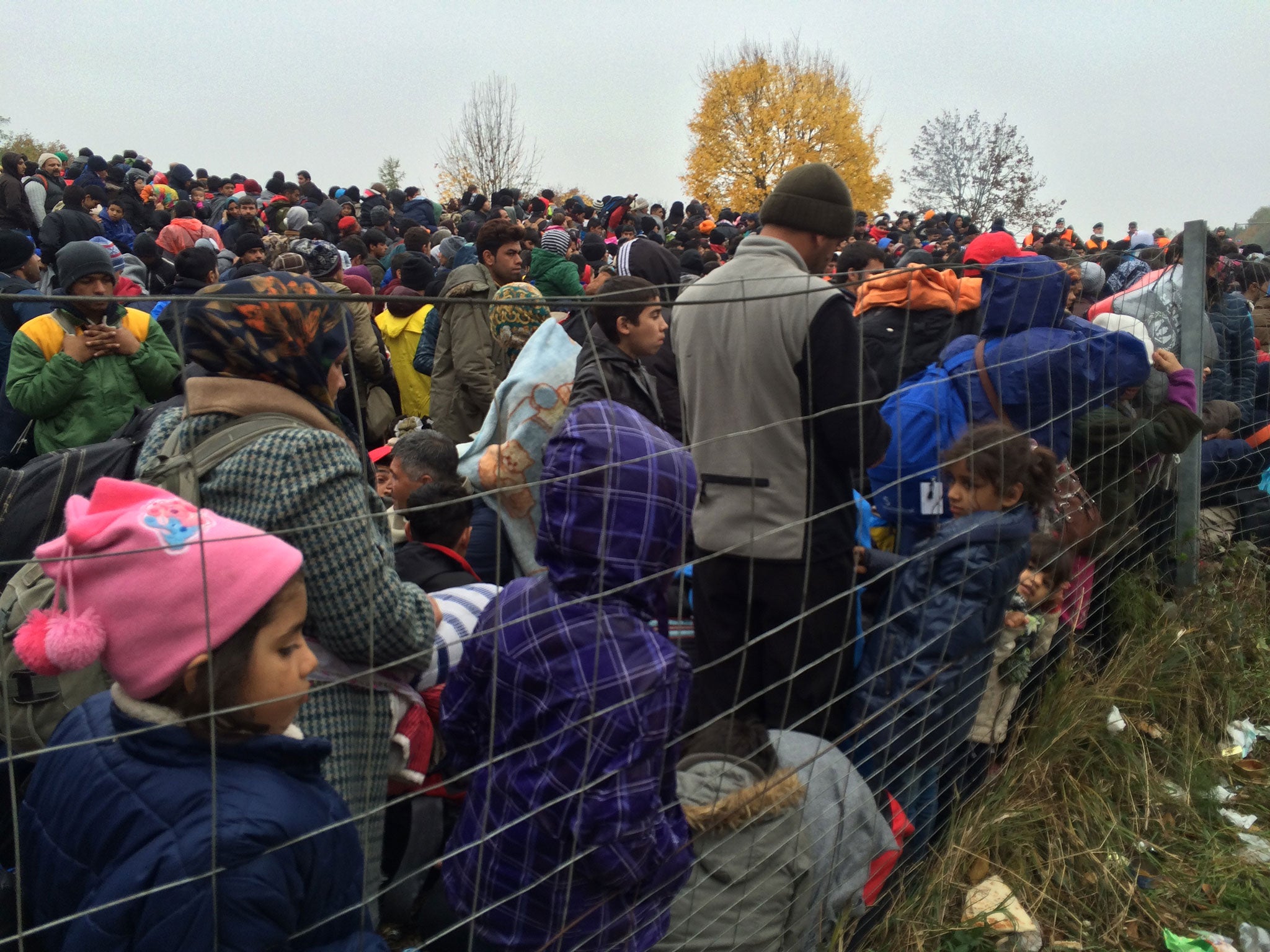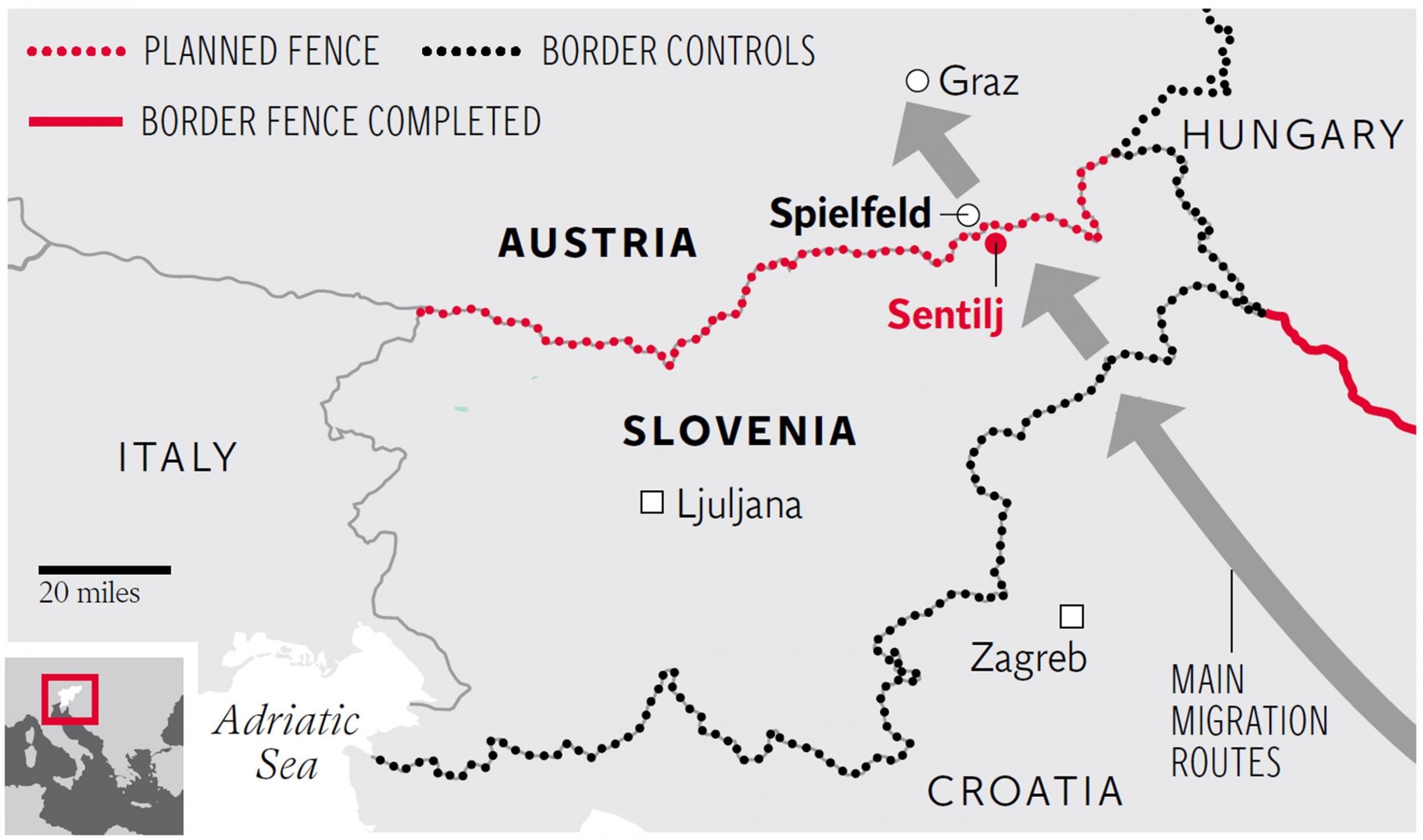Refugee crisis: Slovenia struggling to cope in chaotic scenes at border as violence in Syria forces more to flee
Sentilj, on the border with Austria, has seen chaotic scenes as refugees are being held in a 'no man's land'

Your support helps us to tell the story
From reproductive rights to climate change to Big Tech, The Independent is on the ground when the story is developing. Whether it's investigating the financials of Elon Musk's pro-Trump PAC or producing our latest documentary, 'The A Word', which shines a light on the American women fighting for reproductive rights, we know how important it is to parse out the facts from the messaging.
At such a critical moment in US history, we need reporters on the ground. Your donation allows us to keep sending journalists to speak to both sides of the story.
The Independent is trusted by Americans across the entire political spectrum. And unlike many other quality news outlets, we choose not to lock Americans out of our reporting and analysis with paywalls. We believe quality journalism should be available to everyone, paid for by those who can afford it.
Your support makes all the difference.Aid workers in Slovenia are struggling to cope with record numbers of refugees in the country as fresh violence in northern Syria drives an new influx of people across the Balkans, and eventually to Germany.
The resources of the tiny Alpine country, which only has 5,300 uniformed police officers, are being stretched as plummeting temperatures and increasingly treacherous seas to the south seem to be doing little to slow the tide of refugees flowing into the heart of Europe.
This week, the biggest bottleneck appeared to be Sentilj on the northern border with Austria, where a government-run camp has repeatedly overflowed, leaving refugees waiting in near freezing temperatures in a no man’s land by the border.
On Thursday night there were chaotic scenes at the border for the third night in a row as up to 2,000 refugees waited to enter Austria. Hundreds became crushed against fences as Austrian soldiers tried to keep order and scores of refugees jumped over the barrier. Earlier, up to 1,500 refugees had been marched from a railway station nearly 3km away to reach the camp.
Waiting behind the crush at the fence was Samir Safok, 34, a radio producer from Al-Hasakah in northern Syria. Unlike many refugees who have spent years in camps in Turkey and Lebanon before making the journey to Europe, Mr Safok only left his home 12 days ago.
“You only have two choices in Syria. One is to fight and die against ISIS and Assad, the second is to flee the country. None of us want to leave Syria, but what can we do? There is war everywhere in Syria. Everyone is bombing it. It is the playground for the world’s armies. I blame Russia and American now.”

Mr Safok, who came by inflatable dinghy from Turkey to Kos a week ago, is travelling with his wife and two children in the hope of reaching Sweden. In the last few days he has travelled through Macedonia, Croatia and now Slovenia, where he had been waiting eights hours to cross into Austria.
His two young boys had no winter clothes and had not eaten since the night before. He is angry at the lack of aid and like many is pleading vainly with passing Slovenian soldiers to buy him food from a shop that is within throwing distance of the border, but reserves his fiercest anger for the fighting back home.
“Now Russia is bombing and helping the regime, the war will go on for another five years. The West and Russia will keep bombing and the war will go on for years and years. Every country is bombing Syria, everybody wants to fight Isis.”
The Safok family are not alone. Slovenia has become a key route into Austria and Germany for refugees on the so-called Western Balkans trail since Hungary closed its border with Croatia on 16 October.

More than 179,000 refugees have crossed into Europe by sea this month, according to the latest UNHCR data. That number is 6,000 more than September’s total and Slovenia alone has had to find shelter for more than 100,000 asylum seekers in the past fortnight. Even that though is a figure dwarfed by the more than 720,000 refugees the UNHCR says have arrived in Europe so far this year.
Babar Baloch, the agency's spokesperson for central Europe, told The Independent: “We are still seeing 7,000 refugees a day coming from Greece into the Balkans. That number is not going down. The weather is getting worse and we are seeing more deaths at sea, which gives an indication of how desperate people are now. But that doesn’t seem to be a detriment. It’s hard to say now if and when the number of refugees arriving in Europe is going to do down.”
Roughly 50 per cent of the refugees at Sentilj are Syrians and aid workers say the push to flee the country seems to have escalated since the beginning of the Russian bombing last last month, as intensified fighting in the north of the country has displaced more than 120,000 people in the last month.
The renewed violence has seen forces loyal to President Assad, bolstered by Russian air attacks, launch renewed ground campaigns to take back areas in Aleppo, Hama and Idlib, driving more people to flee into Turkey.

The continuing influx into Slovenia from Croatia saw more unrest at Sentilj on Thursday night and into Friday morning, as large numbers of refugees jumped the border fence into Austria as a line of soldiers tried to maintain order.
Authorities on both sides say they need time to clean camps and prepare buses before they allow in new arrivals, but Mr Baloch said the UNHCR was calling for “far better coordination” between Croatia, Slovenia and Austria to prevent “bottlenecks that leave refugees outside in the cold without shelter.”
He said: “We are asking all the Government to make proper reception centres and shelters. The problem has been managing the intake and outflow, as when numbers go up from Greece we have a knock-on effect if Austria struggles to take more in. We then see that trickle down back down to Slovenia and then down to the border crossing with Croatia.”
Natasa Pirc Musar, president of the Slovenian Red Cross, told The Independent: “The latest indications I am getting from colleagues further south in the Balkans is that numbers are far from dropping. We are very scared that if we don’t get the humanitarian response right people are going to start to die and it will be the children first, they will freeze to death.
“If Austria and Germany cannot keep taking the numbers they have been taking to know we are going to see places like the no man’s land in Sentilj springing up all over the Balkans."
Ms Pirc Musar said that aid agencies on Slovenia were “very close to exhausting” their capacity to help refugees and she feared the humanitarian relief system was “close to collapse” as volunteer worked “around the clock”.
Waiting to cross into Austria at Sentilj was Houssam Diab, a Palestinian Syrian, who worked as an art director for an advertising firm in Damascus before fleeing the conflict. He was sheltering with a group of friends by a campfire, afraid to push to close to the border fence, where Austrian soldiers were using loud-hailers to tell refugees to “stay back” and “don’t push”.
He said: “The situation in my country is very bad. All the countries are fighting in Syria now. My friends back in Syria are all planning to try and leave soon. We have had hard years and more are to come.”
Like many refugees Mr Diab, who spent a year in Istanbul after first fleeing Syria, is travelling alone, in the hope that his family can join him later when is is safe in Germany. “My wife and daughters will follow me. I would not make them endure this journey, this treatment. They should not go through this. The Slovenian soldiers are like boys. They have no experience. Why are we here in the woods? There are no rules here.”
Subscribe to Independent Premium to bookmark this article
Want to bookmark your favourite articles and stories to read or reference later? Start your Independent Premium subscription today.
Join our commenting forum
Join thought-provoking conversations, follow other Independent readers and see their replies
Comments